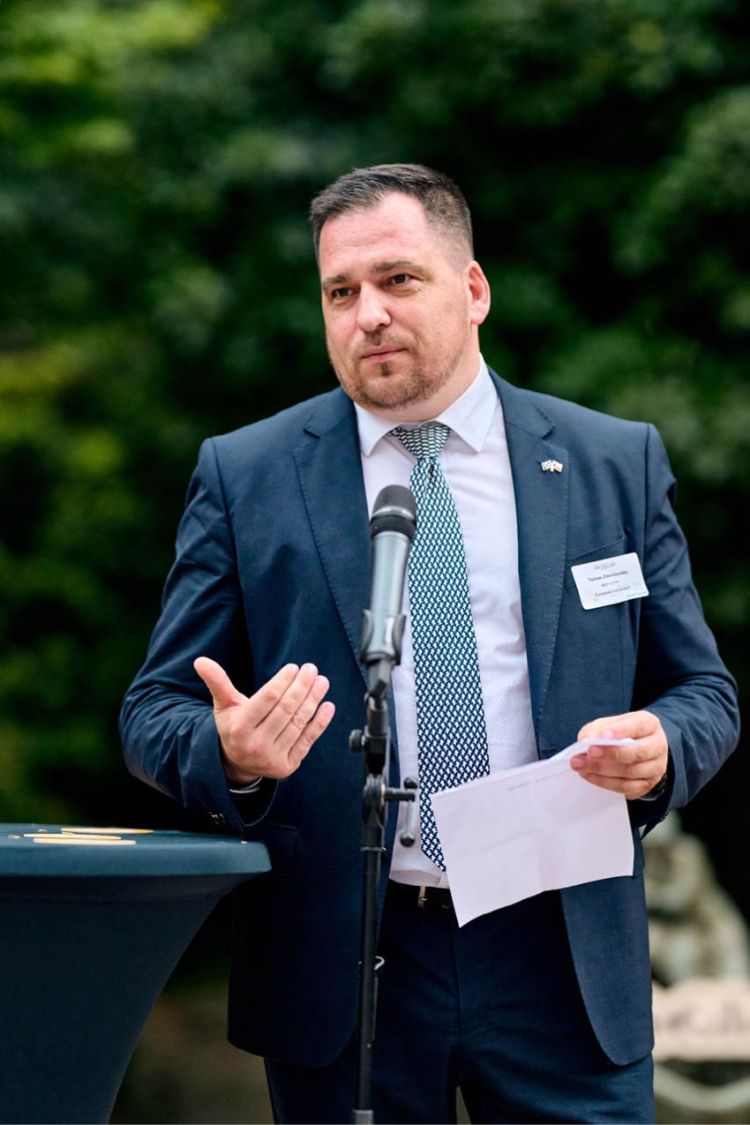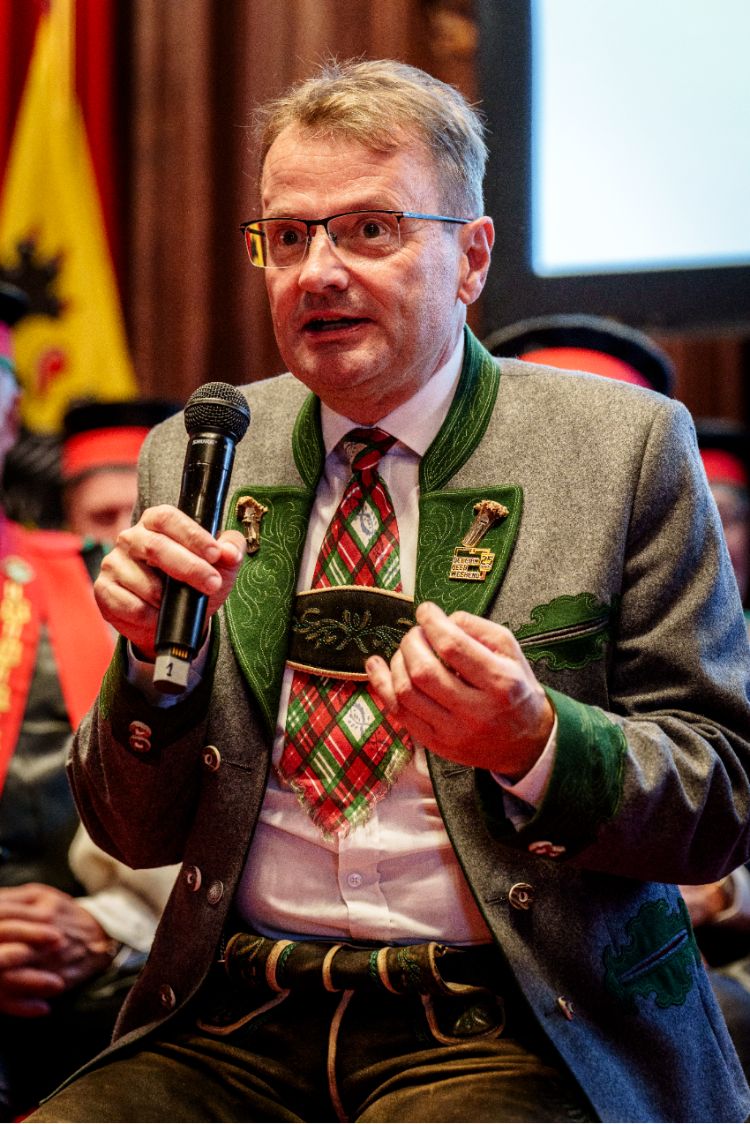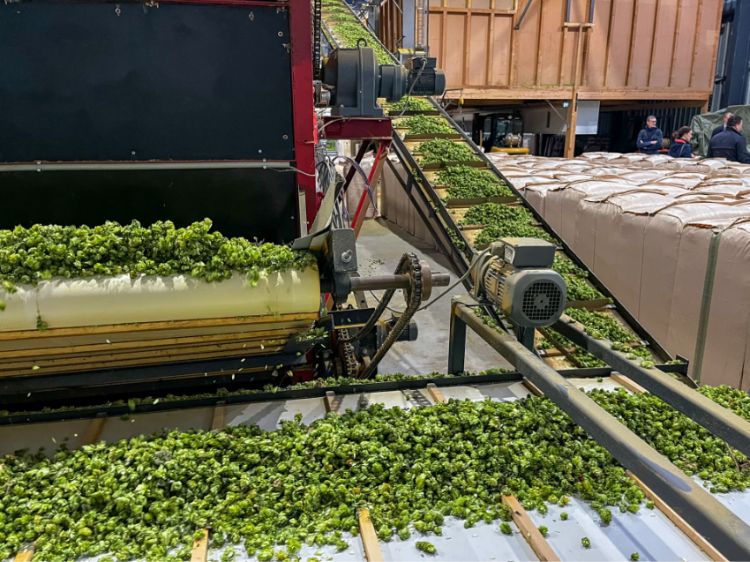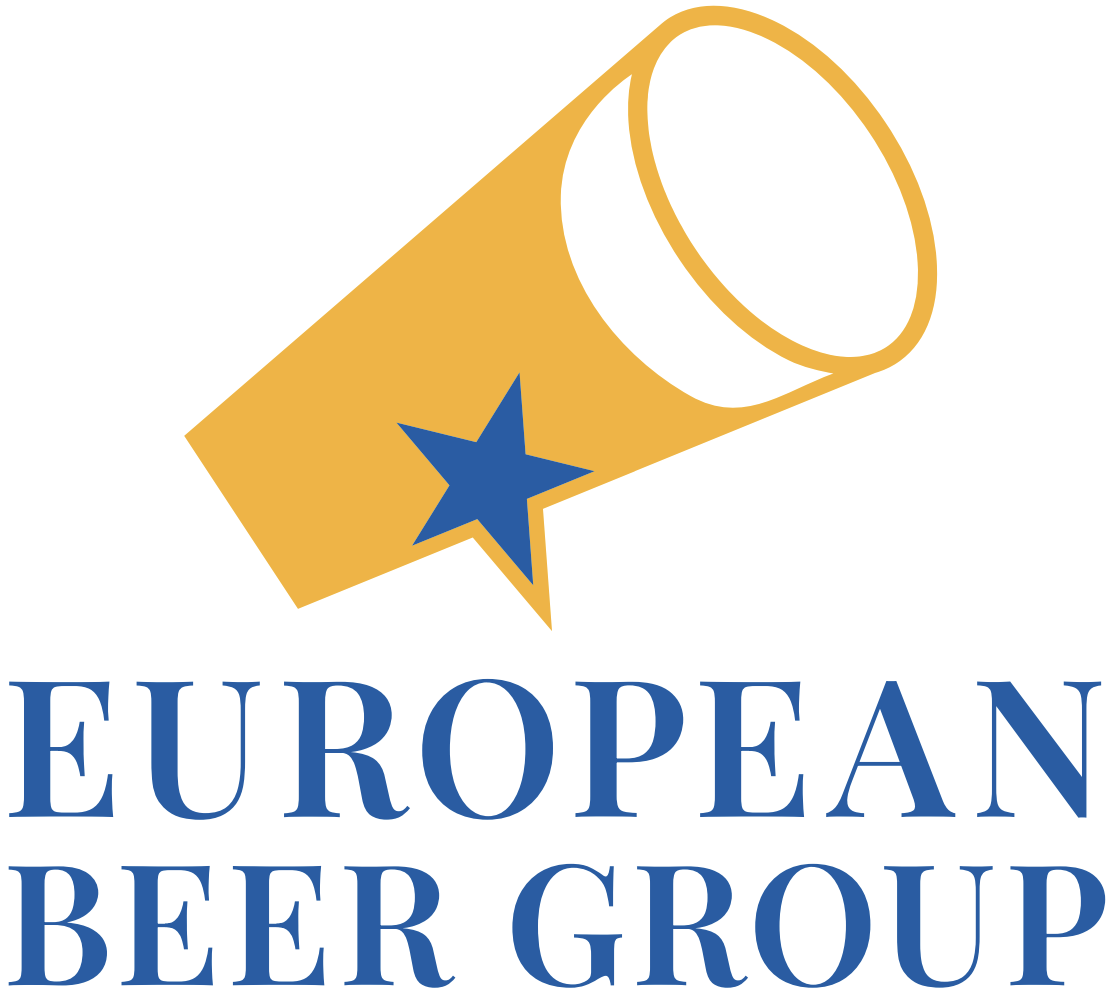What is the European Beer Group (EBG), and what is its mission and vision?
Tomáš Zdechovský: The European Beer Group is a network for discussing beer and brewing within the EU policymaking context. As MEPs, we want a robust brewing sector, given beer’s place in Europe’s identity and its importance for community, jobs, business, agriculture, innovation and sustainability. We want to raise awareness and constructive dialogue amongst decision makers, the beer value chain and other stakeholders.
Hannes Heide: The EBG is about recognising beer’s economic, cultural and social value – and its unique ability to bring people together. This is a challenging time for business, notably with new tariffs, so it is crucial that, in an area where Europe leads the world, the beer sector and value chain have strong representation at EU level. This is where the EBG comes in – and we are open to all MEPs who care about Europe’s brewing sector.
 MEP Tomáš Zdechovský at the European Beer Group Summer Reception, where the Grain to Glass series was launched
MEP Tomáš Zdechovský at the European Beer Group Summer Reception, where the Grain to Glass series was launched
What is the aim of the Grain to Glass series recently launched by the EBG?
Hannes Heide: Grain to Glass is the name for our events and themed visits highlighting Europe’s brewing heritage and its interconnected economy. While the EBG is a broad forum, Grain to Glass brings members directly in touch with brewing, the people behind the beers and the full beer value chain. We will be hosting a lot more events, including during October, the European Beer Month.
 MEP Hannes Heide at the Opening of the Belgian Beer Weekend
MEP Hannes Heide at the Opening of the Belgian Beer Weekend
Tomáš Zdechovský: Last month, we hosted our first Grain to Glass field trip when colleagues and stakeholders experienced the annual hops harvest on visits to an Alsatian hops farm and a processing facility near Strasbourg. It coincided with Parliament’s plenary and showed how closely brewers and farmers are connected.
How important is brewing to rural development and the agri-food sector?
Tomáš Zdechovský: I have seen the beer production process close-up across Europe. It is deeply rooted in the rural economy: local farmers grow the cereals and hops that are vital for brewing. Hop cultivation in regions like Bohemia, Bavaria, Belgium’s Poperinge and Alsace helps keep communities vibrant.
Hannes Heide: The beer value chain supports rural jobs, stabilises demand for crops and encourages sustainable farming practices. Brewing also drives tourism, preserves heritage and supports hospitality. It is a cornerstone of the agri-food sector: sustaining farming communities and promoting rural resilience.
As consumers focus on health and wellbeing, beer must maintain its relevance. We want to promote moderation, transparency and informed choices.
How do you see beer contributing to Europe’s economy and the EU’s broader competitiveness agenda?
Tomáš Zdechovský: Beer is a European success story, both economically and culturally. The brewing sector generates over two million jobs across Europe – not only in breweries, but throughout the wider agri-food chain, from farmers and maltsters to bars and restaurants. Each job in a brewery creates many more upstream and downstream, multiplying growth across sectors and regions. As Europe looks to strengthen competitiveness, beer shows how a heritage industry continues to innovate and thrive: on our September trip, we saw hop growers investing in sustainability and innovation, helping safeguard Europe’s agricultural base.
How can brewing drive innovation and sustainability across the wider agri-food sector?
Hannes Heide: Brewing is well-placed to drive innovation and sustainability across the agri-food sector, thanks to its close ties with farming and its tradition of efficient resource use. I have seen brewers who are pioneers in circular practices. Spent grains, hop leaves and yeast are reused as animal feed, fertiliser, biogas or new food products. Water and energy efficiency are key: breweries are investing in technologies that lower consumption and emissions. Packaging is another area where brewers lead, with reusable bottles, cans circulating through deposit systems and kegs that last for decades.
How can EU policies better connect food production and processing – like brewing – to support rural economies and resilient supply chains?
Tomáš Zdechovský: EU policies must better connect what is grown in the field with how it is transformed into value-added products like beer. A joined-up approach to rural development is essential, ensuring the EU Vision for Agriculture and Food supports not just farming but also the processing and innovation.
Hannes Heide: The EU should encourage investment in local entrepreneurship and resilient supply chains. It must also recognise the environmental and social role brewers play – from circularity to creating spaces for communities – strengthening both competitiveness and rural life.
 On September 9, the EBG led a tour for MEPs to experience the hops harvest outside Strasbourg
On September 9, the EBG led a tour for MEPs to experience the hops harvest outside Strasbourg
Beer is woven into Europe’s cultural fabric, reflecting centuries of craftsmanship, regional diversity, and national traditions. From Irish ales to Austrian lagers, every style tells a story of place, people and ingredients
With so much attention on healthy lifestyles, how can we best balance the enjoyment of beer with a message of moderation and responsibility?
Tomáš Zdechovský: Beer is brewed with natural ingredients – malted cereals, hops, water, yeast, and fruits and spices in some beer cultures. As consumers focus on health and wellbeing, beer must maintain its relevance. We want to promote moderation, transparency and informed choices. As a naturally low-alcohol, fermented product, beer is a great choice.
Hannes Heide: Brewers are also innovating with lower and non-alcohol beers, clearer labelling of ingredients and calories, and in campaigns encouraging responsible enjoyment. Non-alcohol beer is the fastest-growing segment because brewers invested in it and consumers demand it. By innovating and engaging with consumers, policymakers and health stakeholders, brewers show that beer culture is compatible with balanced lifestyles.
What role does beer play in European culture and identity?
Hannes Heide: Beer is woven into Europe’s cultural fabric, reflecting centuries of craftsmanship, regional diversity, and national traditions. From Irish ales to Austrian lagers, every style tells a story of place, people and ingredients. This diversity is not just heritage – it is living culture, evolving with consumer tastes while rooted in sustainable, quality production.
Tomáš Zdechovský: Brewing links the agri-food sector to identity: local grains and hops become expressions of regional pride, supporting farmers and communities. In a continent where food and drink are central, beer embodies conviviality, craftsmanship and shared values.
That is why initiatives like the October Beer Month matter, and why Hannes and I are leading a delegation of MEPs to the Oktoberfest as it returns to Brussels this year. These events celebrate Europe’s beer culture and community. Beer is more than a drink – it is part of Europe’s story, past, present, and future.
Cheers to Beer!
Learn more about the European Beer Group and its activations

Sign up to The Parliament's weekly newsletter
Every Friday our editorial team goes behind the headlines to offer insight and analysis on the key stories driving the EU agenda. Subscribe for free here.